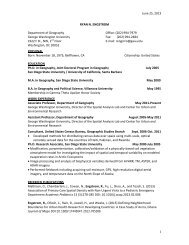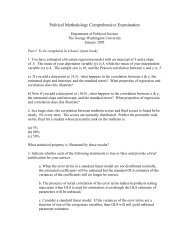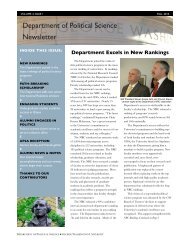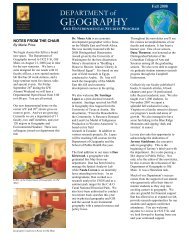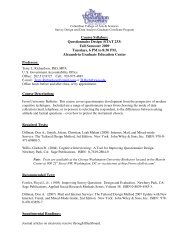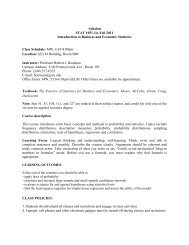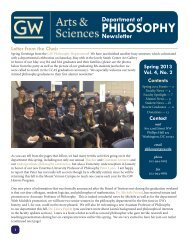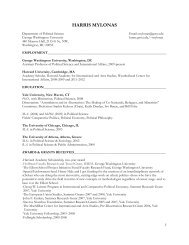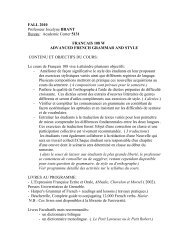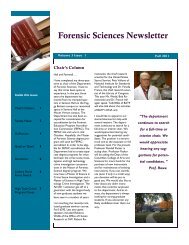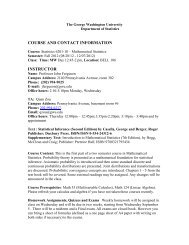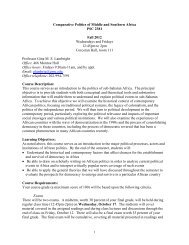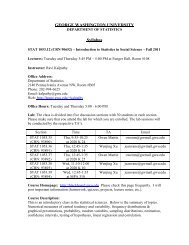Religion - Departments & Programs - George Washington University
Religion - Departments & Programs - George Washington University
Religion - Departments & Programs - George Washington University
Create successful ePaper yourself
Turn your PDF publications into a flip-book with our unique Google optimized e-Paper software.
GW <strong>Religion</strong> Department Newsletter Summer 2012<br />
Congratulations to our 2012<br />
Graduates!<br />
Nikhita M. Dattani<br />
Fady Y. Hijji<br />
Danielle B. Kahn<br />
Kristopher D. Kotek<br />
Justin M. Lanciault<br />
Mashael J. Makhadmi<br />
Dominic Martinez<br />
Jai A. Mirchandani<br />
Kathryn M. Mixon<br />
Nupur Moondra<br />
Urvi V. Patel<br />
Matthew C. Pearson<br />
Kimia Ramezani<br />
Carly R. Schuster<br />
Jeffrey Shenfeld<br />
Behnam B. Taleblu<br />
Tanay R. Tewani<br />
Shaun B. Vaid<br />
<br />
The <strong>Religion</strong> Department welcomes news and updates from<br />
students and alumni.<br />
Please direct correspondence to:<br />
<strong>Religion</strong> Department P 202-994-6325<br />
2106 G Street NW F 202-994-9379<br />
<strong>Washington</strong>, DC 20052 religion@gwu.edu<br />
On the web: www.gwu.edu/~religion<br />
For alumni updates and address changes, please visit:<br />
http://alumni.gwu.edu/connect/update/index.html<br />
Graduating major Justin Lanciault along with faculty Alf<br />
Hiltebeitel, Derek Malone-France, and Xiaofei Kang<br />
MA Program Graduate, Spring/Summer 2012<br />
M.A. thesis Laila Khalid Ghauri<br />
The lack of scholarly investigation into the life and poetic works of the 14 th century female Kashmiri mystic, Lal Ded<br />
(also known as Lalla, Laleshwari, and Lalla 'Arifah), is surprising given the influence she continues to exert on Sufi and<br />
Hindu devotional traditions of north India. Laila Khalid Ghauri's M.A. thesis addresses this lacuna by investigating<br />
Lalla's life and work as the sign of a new direction in the conceptual universes of Kashmiri Shaivite and Islamic Sufi<br />
thought. Arguing that modern debates over Lalla Arifah's religious identity as either Hindu or Muslim miss the basic<br />
message conveyed in her vaakhs, or poetic works, Ghauri points out that Lalla's own search for God necessitated her<br />
move beyond the world of forms and identities to a single Truth. Nonetheless, the vaakhs also suggest a strong<br />
influence in Lalla's work from both Kashmiri Shaivism and Islamic Sufism. This influence is manifest in her<br />
understanding of the Divine – as Shiva in his contradictory aspects of ascetic and family man, creator and destroyer,<br />
masculine and feminine; and as the unmanifest Creator with no equal, the one who has decreed the End of Days to call<br />
humankind to mindfulness. Her vaakhs address both Hindus and Muslims in their language and vocabulary and promote<br />
an inter-religious dialogue that, as Ghauri demonstrates, roots her firmly in the religious and cultural fabric of Kashmir,<br />
positions her as a model of faith for both Hindus and Muslims, and paints her as an advocate of moving beyond the<br />
world of appearances to realize the Ultimate Truth. In these respects, Lalla's poetry suggests the possibility of peaceful<br />
co-existence between Muslims and Hindus through a shared faith in the Divine.<br />
Congratulations to our graduate students for their Achievements!<br />
10



